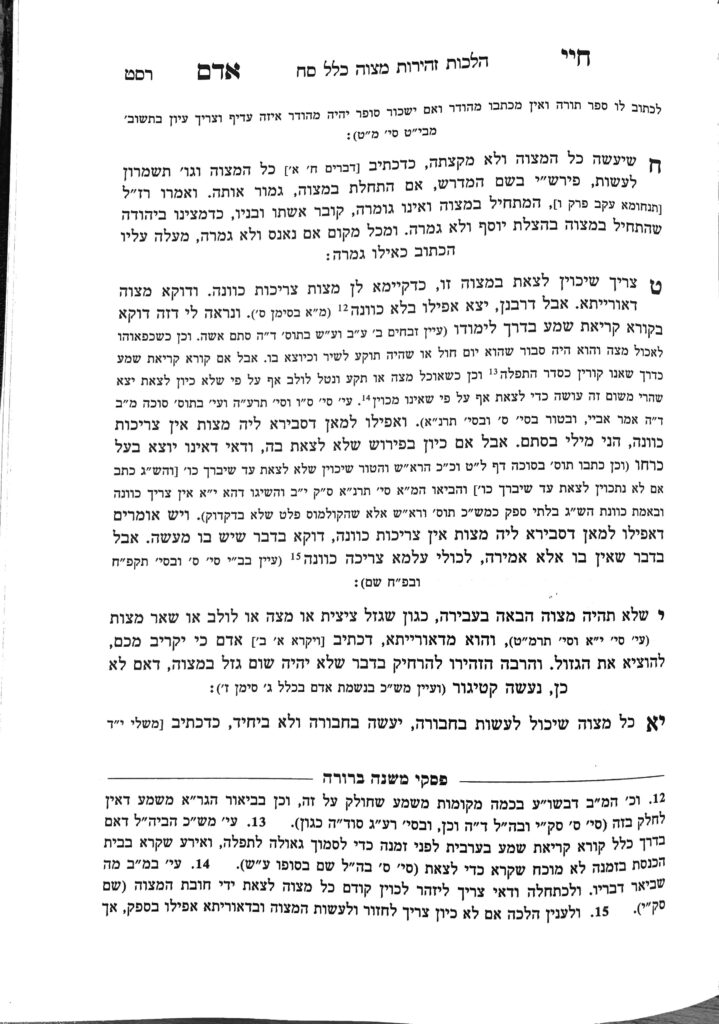We are beginning siman 8, which discusses the concept of hamaschil b’mitzvah omrim lo g’mor, that a person should not stop in the middle of a mitzvah, but should complete it. The Chayei Adam brings a source to this concept from the beginning of Parshas Eikev, where the Torah says kol hamitzvah . . . tishmerun la’asos (Devarim 8:8). Rashi on this pasuk quotes the midrash which teaches that if a person begins a mitzvah, they should complete it in entirety.
The Chayei Adam continues, and quotes the Midrash Tanchuma on Parshas Eikev, which says that if a person begins a mitzvah and willingly stops in the middle, they will bury their wife and children. The Midrash understands that this is what happened to Yehuda. Yehuda began the mitzvah of saving Yosef by convincing his brothers not to kill Yosef, but did not finish it, because he did not return Yosef home to Yaakov. The Midrash understands that he was punished for not finishing the mitzvah by losing his wife and two older children. However, the Chayei Adam clarifies that if a person does not finish a mitzvah due to oneiss (circumstances which were not his fault), not only does Hashem not punish the person, but considers it as though he did finish the mitzvah.
We need to clarify this point. The Gemara in Sotah says that the pasuk at the end of Sefer Yehoshua credits B’nei Yisroel with taking Yosef’s bones out of Mitzrayim. The Gemara questions that Moshe was the one who brought Yosef’s bones out of Mitzrayim, and explains that since Moshe did not finish the mitzvah, the mitzvah is not called in his name. Since B’nei Yisroel finished the mitzvah, they received the credit for it. The Chayei Adam’s point that when someone is an oneiss they still receive credit for the mitzvah would appear to go against this Gemara.
It seems that the Chayei Adam understands there are three levels of not completing a mitzvah. One level is when the oneiss is so compelling, it is as if you completed the mitzvah. A second level is when a person’s negligence causes them to be unable to complete the mitzvah, so they are not punished, but do not receive reward for it. The third level is where there was significant negligence on a person’s part, so they are punished.
There are no Gemaras which discuss this concept in a halachic sense. We have the Midrash Tanchuma and Gemara Sotah quoted above, which discuss the punishment for one who does not complete a mitzvah, but no apparent source in context of a halachic discussion of how to properly complete a mitzvah.
The Gra suggests a source in the Gemara which we will discuss tomorrow, be’ezras Hashem.
The Mesillas Yesharim discusses this concept in regards to zrizus for a mitzvah. He writes that in the same way one needs zrizus to start a mitzvah, to ensure they do not lose the opportunity to begin it, one needs zrizus to complete it, in order to fulfill this concept.
Summary
Hamaschil b’mitzvah omrim lo g’mor is the concept that one should finish a mitzvah they have started. If one does not finish the mitzvah:
If they were completely an oneiss, they receive credit as though they completed it
If they were somewhat negligent, they do not receive credit, but are not punished.
If they were significantly negligent, they will be punished by losing their wife and children, r”l.



